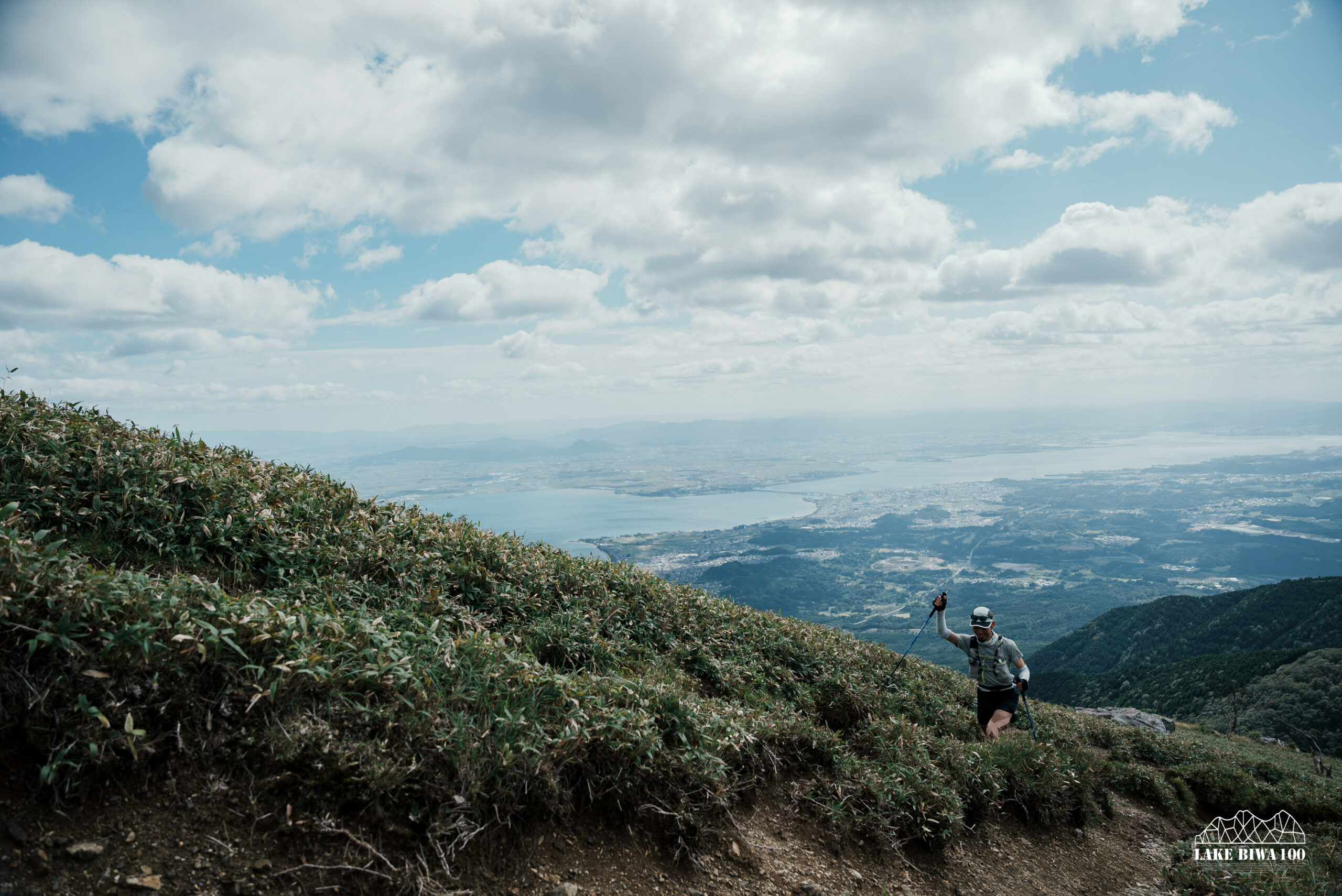
レースのコンセプト
このレースは各自のペースで各チェックポイントと最終の関門時間内に進む、シングルステージレースです。各エイドステーション間を補うのに十分な、飲料や食料はもちろん、悪天候や身体的問題、ケガに対応しうる、衣服や安全を確保するギアを携帯しなければなりません。このコンセプトは以下の規則等を満たすものでなければなりません。
1. 規則
- ゴール制限時間(52時間)を設ける。
- 必携品はレース中常時携帯する必要がある。レース中抜き打ちの必携品チェックも実施されます。
- 各エイドステーションを出る際は十分な飲料と食料を携帯すること。このレースは各エイド間が長く、遅い選手では8時間以上かかる区間もある。自販機なども積極的に使用すること。
- エイドステーション(AS)は順番通りにすべて通過すること。ほとんどのAS、WSに関門時間を設定しており時間内に通過できなかった場合は失格とする。(関門時間とは、ASを出る時刻を指す)
- 大会が配付するGPXファイルのルート通りに進む。(最低限のマーキングは行う)
- ストックの使用を認める。(使用禁止区間あり)
- 鈴鹿国定公園特別保護地区:ブナ清水分岐(5km)〜イワクラ尾根分岐(14km)※ 舗装路・ゲレンデ区間を除く は徐行区間とし、ストックの使用を禁止する。
- 比叡山ドライブウェイの橋を渡ってからにない堂(石段➡︎浄土院➡︎にない堂)エリアは、熊鈴を禁止とし徐行区間とする。(134km~135km地点)
- トイレはできるだけ公共のトイレを利用する。止むを得ないときは携帯トイレを使用すること。携帯トイレを使用した場合は、次のASで未使用品を配布する。
- 一般公道を走る際は、交通法規を遵守すること。
- 大会中に遭難、負傷事故等に遭遇した場合は、人命を最優先としレースを中断して救助等に協力すること。
- スマートフォンの電源は常にON(機内モード不可)にしておくこと。(重要な情報はSMSで送信します。)
- 市街地、住宅地、別荘地などでは、熊鈴は音が鳴らないよう配慮すること。また夜間の走行の際には静かにすること。
- 黄瀬交流館さらら(AS4:75km地点)では、IBUKI端末を交換すること。
2. 禁止事項
- コース上の一般利用者(登山者、ハイカーなど)に配慮せずその通行を妨げる
- トレイルから故意に外れる
- コース上及び全区域で動植物、菌類、岩石などを採取、及び建造物等を損傷させる
- ゴミ等をトレイル上に捨てる(ごみ等はASで処理すること)
- イヤホンを使用する(骨伝導イヤフォンのような耳をふさがないタイプは可)
- 裸足・サンダル等で走行する
- 食料や装備等を事前にコース上にデポする
- 競技中、車や公共交通機関で移動する
- ドーピング等
- 競技者以外の並走
- サポート箇所に指定されたAS以外でのサポート
- サポートやその他帯同者の違法駐車や悪質なマナー違反(選手にペナルティーが科せられます)
3. 失格およびペナルティー
上記の規則・禁止事項に反した場合、失格またはペナルティーを科す。
以下は、失格またはペナルティーを科す事例である。掲載なき事例はその都度大会本部で協議の上決定する。
<失格の事例>
- CPを関門制限時間で通過できなかった場合(関門時間はCPを出る時間とする)
- 安全を確保するために定められた必携装備を持っていなかった場合
- 指定された場所AS以外でサポートを受けた場合
- 大会スタッフの指示に従わなかった場合
- 登山・ハイクのモラル・マナーに大きく反した場合
- 自然環境を破壊する行為を行った場合。またその恐れがあるルートを故意に通行した場合。
- 地域住民や山で作業をしている方に多大な迷惑や損害を与えた場合
- 悪質な行為と認められる場合
- 競技中、車や公共交通機関で移動した場合
- コースを大幅にショートカットした場合
- ASを通過しなかった場合
- コース上にごみ等を故意に廃棄した場合
- その他大きな過失があった場合
- 伴走を受けた場合や、エイド内のルールに従わない等の違反行為を、マーシャルやエイドリーダーなどから注意を受けても継続する、もしくは別の個所で再度同様の違反行為に対する注意を受けた場合。
<ペナルティーの事例>
- 伴走を受けた場合、ポール使用禁止区間でポールを使用する、エイド内のルールに従わないなど。
- スマートフォンの電源を切るもしくは機内モードにしていた場合
- 所定の場所にナンバーカードを着けていなかった場合
- コースロストによる意図しない軽微のショートカット
- 携帯トイレなどの命にかかわらない必携装備の不携帯
<大会本部により決定>
- IBUKI端末を紛失、もしくは、充電切れした場合
4. 必携装備
選手は以下必携装備(推奨装備含む)を持って競技に参加すること。なお、必携装備チェックは受付時に全員行うこと。また、ASにおいてランダムにおこなう。
山岳の長距離トレイルランニング競技に適した服装・シューズ・バックパック及び以下必携装備を必ず全行
程で装備すること。(デポバッグに入れているものは不可)
ナンバーカード:1枚配付
※身体の前面(トップス等)の見えやすい箇所に装着のこと。
スマートフォン
※コースのGPXファイル及び、GPXファイルを表示するためのオフライン地図アプリを事前にダウンロードのこと。
※レース中及び前後は常に連絡がとれる状態にしておくこと。(緊急・重要なお知らせはSMSまたは電話でおこなうため)
*フライトモードにはしないでください。スタート前に満充電にしておいてください。大会本部・副本部の電話番号を登録しておいてください。
GPS端末(IBUKI)(IBUKI端末なしでエントリーされた方はレース当日に配布いたします)
ライト:2セット(予備電池・バッテリー含む)(チャージ式のヘッドライトとモバイルバッテリーの組み合わせは認めるが、最低一つは予備のバッテリーがあるヘッドライトを使用すること)
モバイルバッテリー(スマホ、ライト用)
レインウエア上下(透湿防水性能があり、シームテープで防水加工してあるもの)
保温用長袖ウェア(コットン以外の保温性のある生地の中間着180g以上あるもの1枚か、 ベースレイヤー的なコットン生地以外の長袖110g以上とウィンドブレーカーのセットどちらか)
足首まで覆う長ズボンorタイツ(タイツとハイソックスの組み合わせで脚をすべてカバーできるものは認める)
保温用帽子(バフでも可だが、ヘッドバンドは不可)
指先までおおわれる保温用手袋(鎖場も多いため滑りにくいもの)
食料(800Kcal程度以上)・飲み物(1.5L 以上)
150ml以上のマイカップ(暖かいドリンクやスープにも適したもの)
スポーク or はし or フォーク等(エイドで食事をする際に使用するもの。エイドには箸などの用意はありません。)
サバイバルブランケット(130cm 以上×200cm 以上)
ファーストエイドキット(消毒薬、テーピング等)
健康保険証(コピーは不可)外国人選手は保険の証明書
携帯トイレ
熊鈴
点滅ライトもしくは反射板を後ろから見えるようにザック等に装着(装着は夜間のみでOK)
ホイッスル
- 必携品おすすめ装備
大会メインスポンサーのSalomonからおすすめ装備を紹介します。装備に不安のある方はぜひご覧ください!
<シューズ>
S/LAB GENESIS ユニセックス
山岳系のサーフェイスにも対応できるアウトソールと、軽量で耐久性に優れたMatryx®アッパーを採用。Energy Foamミッドソールはクッション性と反発性のバランスに優れているため、ゴールまで快適で安定した足運びを実現します。その他にも両サイドに配された着地安定性を高めるプレートや異物の侵入を防ぐショートゲイターも備えており、タフなLAKE BIWA 100のコースにぴったりなシューズです。
GENESIS メンズ
GENESIS ウィメンズ
S/LAB GENESISの一般向けモデル。プレートのつくり、ヒールカップ周り(ゲイターではない)、アウトソールパターン(接地面が増え、安定感が増している)などが異なっており、基本的なコンセプトはS/LAB GENESISを踏襲しつつ価格も抑えたオールラウンドモデルです。
ULTRA GLIDE 3 メンズ
ULTRA GLIDE 3 ウィメンズ
履いた瞬間から止まる瞬間まで快適な履き心地が持続する Ultra Glide 3。驚異的なクッション性と機動性がストライドにパワーをもたらし、どんな距離でも走りの陶酔感を味わうことができます。これほど楽にランナーズハイの境地に導いてくれるシューズがあったでしょうか。。
<バックパック>
ADV SKIN 12 SET ユニセックス
ハイドレーションベストのベストセラーが、安定性、フィット感と汎用性を高めた新しいデザインで復活。過酷な耐久レースをはじめニーズに合わせて使える Adv Skin 12 は、簡単に水分補給でき、長時間の快適な着用感と動きやすさを確保します。
この 12 L バージョンは長距離トレイル(60km 以上)に最適です。
<レインウエア上下(透湿防水性能があり、シームテープで防水加工してあるもの)>
BONATTI TRAIL メンズ
BONATTI TRAIL ウィメンズ
BONATTI TRAIL 防水ジャケットは、デザイン性に妥協せず、テクニカルなトレイルでも活躍する機能性を追及しました。
軽量の日本製高品質 Pertex® ファブリックが優れた防水性を発揮。最適にフィットするデザインは、12L の Salomon ハイドレーションパックの上からの着用も可能です。
BONATTI WATERPROOF ユニセックス
開口部がジッパー式になっており、シューズを履いた状態でも楽に脱ぎ着できるレインパンツ。収納はふくらはぎ内側にあたるメッシュポケットにできるようになっており、ミニマムなつくりで携行するにも邪魔になりません。
<保温用帽子及び手袋(鎖場も多いため滑りにくいもの)>
CROSS WARM ユニセックス
冬の必需品、CROSS WARM グローブ。優れた通気性と保温性を誇るこのグローブは、タッチスクリーン対応ファブリックを採用しており、使用しない際は簡単にポケットに収納できます。
BONATTI WATERPROOF ユニセックス
完全防水のPertex®Shieldを全面に使用したミトン。グローブの上からも着用でき、雨風をシャットアウト。親指以外はカバー状になっており、開いて指を出せば温度や湿度の管理もできます。
<食料(600Kcal程度以上)・飲み物(1.5L 以上)>
フラスク&リザーバー
様々な容量のソフトフラスク、リザーバーをラインナップしています。
<マイカップ>
SOFT CUP SPEED 150ML/5OZ
片手に収まり、くしゃっとポケットへコンパクトに収納可能なソフトな素材のマイカップです。
5. 推奨装備
- 現金・交通ICカード
- 日焼け止め・サングラス・ワセリン
- 着替え
- ストック
- ナビゲーションができるGPSウォッチ
- 防水手袋
6. 選手のデポバッグ
デポバックとゴールバッグの2つを預けることができます。いずれも受付の際に配布するゼッケン番号の書かれたラミネートカードを指定の場所に取り付け、スタート前に会場のデポバッグブースへ預けけてください。宿泊者は宿泊ありと書いたラミネートカードをゴールバッグにつけてください。
ゴール(比良レークハウス)行のゴールバック(任意のバック)ラミネートカードは見えやすい場所に取付
以下AS3箇所用のデポバック。(参加賞の40リットル防水バッグ)ラミネートカードはボストンバッグの横部分の取っ手に取り付け(左右どちらでも可)
デポバックとして大会が配付する約40Lの防水素材のボストンバッグに全て荷物を詰めてください。デポバックは、デポバッグ受け取り可能な以下の3つのASへ大会側が順次運搬します。
※途中からサポートが運ぶ等、大会側に戻さない場合は必ずエイドスタッフにお伝えください。
AS3 余野公園(46.2km地点)⇒AS5 田上枝公園(97km地点)⇒AS8 還来神社(149.6km地点)⇒ゴール
デポバックは大量に大型車やトラックに積み込まれるため、破損の心配のあるポール等は入れないようにしてください。またジェルなど液体のものは押しつぶされて中身が漏れた時のために、ビニール袋に入れておくなどの準備をする、腐りやすい食べ物などは入れないなど、お気を付けください。デポバッグの中の物の破損について大会側では一切の責任は負えません。
以下、想定されるデポバックの主な中身です。
- 飲食料(飲み物、ジェル、固形食、インスタント食品、レトルト食品等)
- 着替え、防寒着、レイン、シューズ
- 救急用品、常備薬、タオル(大小)、ティッシュ
- モバイルバッテリー、電池、ライト
- リタイア時の衣類・寝袋等(公共交通機関や送迎車でゴール地点まで行く必要があるが、待ち時間が長時間になる場合もある)
7. サポートについて
- 選手のサポートは、サポート登録を完了している方のみとします。
- 大会期間中、重要なお知らせは選手同様サポートの方にもSMSが届きます。
- エイドに入れるのは1選手につき1名のサポートのみとします。(子供同伴可)
- エイドに持ち込める荷物は40Lバッグ1つ分程度とします。
- エイドスタッフの指示に従わない、迷惑駐車などをされた場合、サポートする選手にペナルティーが科せらます。
- エイド混雑緩和のため、サポートする選手がエイドに来る10分~30分前にエイドに入り、選手が出た後は速やかに退出すること。
- エイドの駐車場での車中泊は禁止
8. 保険
大会主催者は、選手の事故・傷病などに備えて傷害保険に加入する。傷害保険の加入にあたり、下記の内容を承諾のこと。
- 参加者が自分自身・あるいは第三者に与えた損害・損失等について主催者は一切その責任を負わない。
- レース中の事故について、傷害保険による保険給付限度額以上の補償には応じない。保険給付限度額以上の補償が必要な場合は各自で加入すること。
- 大会として加入するのは傷害保険のみで、遭難時の捜索費用などは保険の対象外となる。必ず各自で山岳保険(遭難捜索費用保障を含む)に加入すること。
- 傷害保険の補償範囲は以下の通りである。この補償内容が不十分である場合、各自の判断で保険に加入すること。
- 死亡:500万円
- 後遺障害:62.5万円~500万円(等級により)
- 入院(日額):5,000円
- 通院(日額):3,000円
9. 中止等の基準
以下の事由により大会の開催、継続が困難であると判断した場合は、大会主催者は大会の中止・中断・コースの変更等を行う。
- コース上で特別警報が発令された場合
- 重点対策エリアにおいて暴風警報が発令された場合
- その他同等の警報等が発令された場合
- コースの崩落、コース上の崖崩れ・落石等選手の安全を確保できないと判断される場合
- 重点対策エリアにおいて、高度1000m付近で25m/s以上の風速が想定される場合(てんきとくらす:御在所岳・鎌ヶ岳・蓬莱山等を参照)
- 重点対策エリアにおいて落雷が想定される場合
- 道路の通行止め等により安全な大会運営が困難となった場合
- その他、大会の開催・続行ができないと判断した場合
